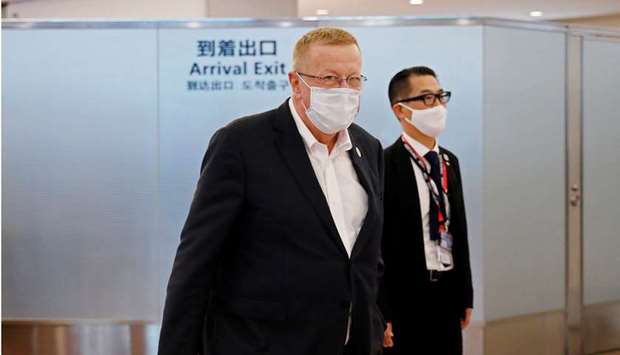International Olympic Committee vice-president John Coates arrived in Japan on Tuesday, as organisers ramp up final preparations with just over five weeks until the pandemic-postponed Games open.
Ahead of his arrival, several dozen people protested against the Games in Tokyo, though recent opinion polls suggest public opposition may be weakening.
Later Tuesday, organisers will release the final version of their virus countermeasures for athletes in a so-called ‘playbook’ that they say will keep the event safe.
They have already announced measures including daily testing for athletes and GPS tracking of journalists coming from abroad, in an attempt to reassure a sceptical public.
National polls have regularly shown most people in Japan oppose holding the Games this summer, preferring either a postponement or cancellation.
But with the first foreign athletes already in the country and Olympic officials arriving, there is some evidence that opposition may be declining.
‘I hope they will hold the Games with spectators,’ 54-year-old Michiyo Saito told AFP in Ota City, north of Tokyo, which is hosting Australia's softball team ahead of the Games.
Several hundred residents turned out Tuesday to watch the team train.
‘They came from very far away, so I wanted to support them in any small way I can,’ Saito said.
‘I am scared of the coronavirus. But as they seem to have anti-virus measures in place, I thought it would be OK.’
- Emergency restrictions to end –
A survey in early June found half of the Japanese public back holding the Games, and a new poll published late Monday showed 64 percent now support it going ahead.
The new survey by national broadcaster NHK found 31 percent of respondents want the Games cancelled, down from 49 percent in May.
In all, 64 percent said they want the Games to go ahead -- including 29 percent who favour a ban on spectators, 32 percent who want limited spectators and three percent who want no restrictions on fans.
The poll did not give the option of postponement, which organisers have ruled out.
Coates will be in quarantine for three days, according to local media, and subject to some restrictions on his movement after that.
Japan's mandatory 14-day quarantine for overseas arrivals is being relaxed for Olympic participants.
But organisers insist that Tokyo 2020 will be safe, with athletes tested daily and prevented from contact with Japan's public.
Around 84 percent of athletes have already been vaccinated, Coates told the Australian Financial Review newspaper before departing for Tokyo.
‘We can never get to 100 percent, I don't imagine, but if we can try and identify who hasn't been vaccinated and ensure they're vaccinated,’ he said.
Athletes from some Asian and African countries are being flown to Qatar for vaccines, while South American athletes are being flown to Miami and Houston for shots organised by the IOC, he said.
Overseas fans have already been barred from the Games, with a decision on how many domestic spectators will be allowed expected in late June.
The ruling will come after a virus state of emergency in Tokyo and other parts of the country, mainly requiring bars and restaurants to close early and stop serving alcohol, is lifted on June 20.
Kyodo news agency reported late Monday that the government could keep some restrictions in place in Tokyo during the Games, potentially limiting the number of spectators who could attend.
Japan has seen a smaller outbreak than many countries, with just over 14,000 deaths, but Prime Minister Yoshihide Suga's government has come under fire for its response.
On Tuesday, opposition parties filed a motion of no confidence, but it is expected to fail given the government's large majority.

